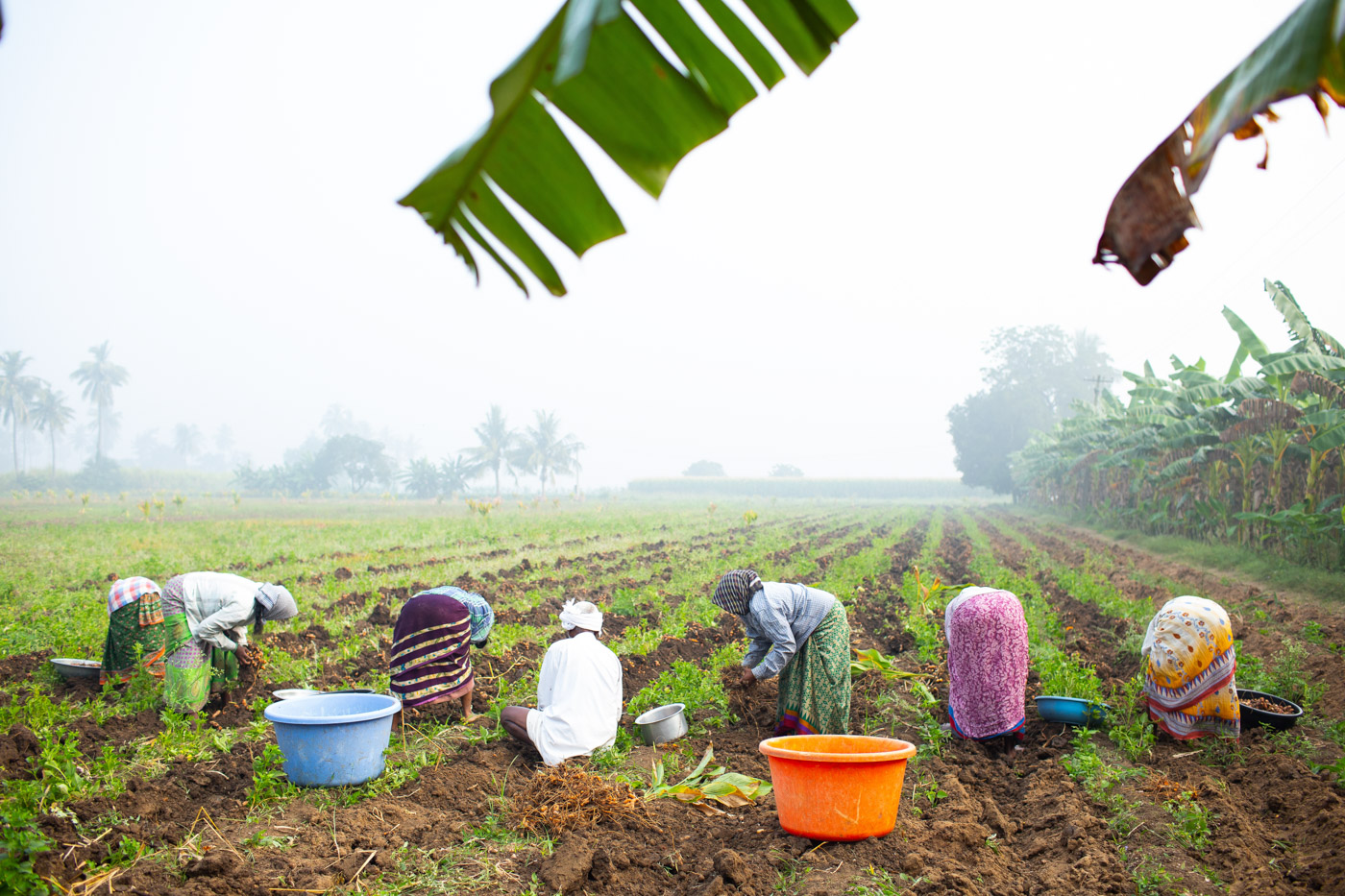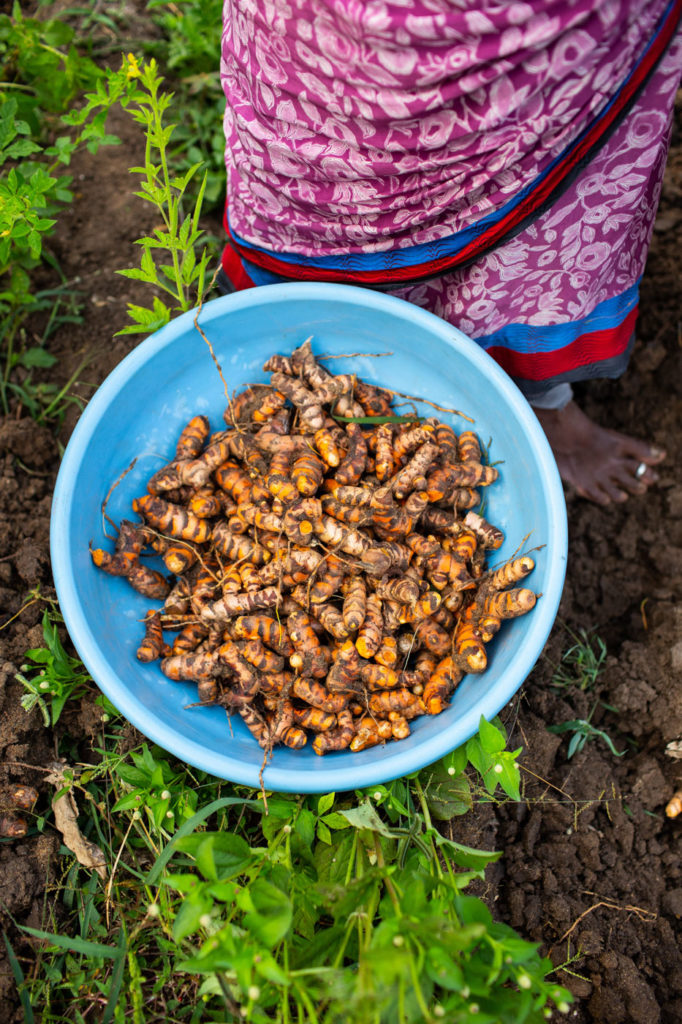Diaspora Co.’s Vision for the Spice Trade’s Future
Diaspora Co. prioritizes transparency, equity and sustainability while providing fresh, high-quality spices.
Editor’s Note: This story is published in the Winter 2021 edition of Life & Thyme Post, The Tradition Issue, our exclusive newspaper for Life & Thyme Members. Subscribe to Life & Thyme Post
When Sana Javeri Kadri moved to the Bay Area in 2016, she had no dreams of a career in the spice trade, let alone plans to overhaul the entire system. Less than a year later, however, a confluence of events spurred her to return to Mumbai—where she was born and raised—to better understand the roots of the modern spice trade, to reconnect with her own roots, and to learn about roots of another kind: turmeric.
Kadri had been living in Southern California for four years and witnessed turmeric entering American pantries and diets as one of many trendy ingredients used to tinge lattes and market to the health-conscious.
“I was really concerned about the superfoodization of turmeric,” says Kadri. “I wanted to know who was growing the turmeric for the turmeric lattes. This movement was clearly rooted in morality and wellness, so did the turmeric they were buying match the supposed ethics of this wellness industry?”
These concerns were on Kadri’s mind at the same time that other, more personal concerns were surfacing for her in the wake of the 2016 election as a person of color, an immigrant, and a queer woman.
“I just didn’t want to be here anymore, and I wanted to work on something that mattered,” Kadri remembers. These feelings motivated her to buy a ticket back to Mumbai where she set out to photograph Indian turmeric farmers.
“I had an idea that maybe I’ll sell turmeric, but I had no money to my name,” says Kadri, who was twenty-three at the time. “It didn’t really occur to me as something I could do or was even allowed to do.”
In early 2017, Kadri began visiting turmeric farms, traveling from Kerala in the south to Uttarakhand in the north, eventually ending up in the eastern state of Andhra Pradesh where she found the farmer who would supply tumeric to Diaspora Co.

Along the way, she realized the contemporary spice trade had not changed much from the model originally constructed under British rule, despite the fact that India had gained its independence in 1947.
“For nine months in 2017, all I was discovering was that the colonial spice trade had really just perpetuated that injustice into capitalism. Indian farmers were making no money and traders made all the money,” Kadri explains. “Because the system was rooted in that injustice of profit first, there was never a switch in the whole system toward flavor, quality or freshness.”
This experience and the revelations that followed led Kadri to reflect on the word “decolonization” as someone who had grown up in the postcolonial city of Mumbai, as well as how she could translate this word into meaningful action.
“At a crossroads like that, working to rebuild the spice industry seemed like the perfect work of decolonization,” she says.
Kadri returned to the Bay Area in September of 2017, and with just a few thousand dollars of her own and a small loan from her father, she made her first turmeric purchase. She also founded two companies: Diaspora Trading, an Indian export company, and Diaspora Co., an American import company.
In the conventional spice supply chain linking India and the U.S., an Indian turmeric farmer sells their product to a local auction house where a trader purchases it. The turmeric is then bought and sold by various traders throughout India several more times before it is sold to an exporter. Along the way, the turmeric is mixed with turmeric from other farmers. This blend is sold to an American importer and then, finally, it is sold to the store where American consumers can buy it off the shelves.
In this system, the farmer receives a negligible fraction of the final price, and the individual characteristics of their spices are no longer discernible, which means the farmers have no incentive to grow a high-quality product.



By founding both an Indian export company and an American import company, Kadri eliminated unnecessary links in the spice supply chain to benefit the people it connects on either end: the farmer and the consumer.
“I can buy at a pretty high price from farmers,” she explains. Next, Diaspora Trading sells the spice to Diaspora Co., which sells directly to consumers. In this way, Kadri controls the entire supply chain and guarantees the spices are premium quality and fairly priced.
The more direct journey from farmer to consumer also ensures the spices are fresh. In some cases, Diaspora Co. is able to offer spices for sale as little as two weeks after they have been harvested.
Kadri has embraced what she calls “radical transparency” when describing to consumers the unique, yet simple spice supply chain she has built. She hopes to help them see that the farm-to-table movement can span across the entire food system.
From fruits and vegetables to meats and cheeses, and even specialty items like coffee and cacao, modern consumers have come a long way in understanding that our food is grown, raised, or made somewhere by someone, but this kind of attention is rarely focused on spices.
Spices are “expected to be cheap,” says Kadri, and consumers are not accustomed to considering factors such as the variety of the spice, how it was farmed, or when it was harvested.
Each Diaspora Co. product is labeled with its harvest year to bring attention to the freshness of the spice, which is essential for aroma, flavor, and nutritional quality. This information is intentionally absent from the packaging of most commodity spices to hide that the contents are often several years old and, consequently, dull and dusty. Instead, commodity spice labeling tends to emphasize characteristics that are irrelevant to the quality of the spice, such as its trade name.
“Most trade names are not actual scientific varieties,” explains Kadri. “Tellicherry peppercorns, Malabar peppercorns—those are just sizes of peppercorns. It’s like saying all yellow tomatoes are Sungolds. That’s not true. Those are standards set up by colonizers—by the British—because they didn’t know any better. They didn’t care to know any better.”
Kadri, on the other hand, cares a lot—especially when it comes to her farm partners. “I started the company to be in service of farmers,” she says.
To escape the for-profit mindset that characterized the colonial spice trade and continues to drive the commodity spice trade today, Kadri works closely with farmers to determine a fair payment for what they grow.
“The farm partner tells me the price they think they should get,” explains Kadri. “And most of the time I say: Have you thought about your water bill? Have you thought about your labor costs?”
While “sustainability” has become a buzzword in the food industry primarily from an environmental standpoint, Kadri is equally committed to economic and social sustainability. Aside from paying Diaspora Co. farm partners adequately for the hard work of farming, Kadri also offers her partners the opportunity to opt into an education or healthcare program with her support.

By taking care of her farm partners, Kadri helps them focus on taking care of their land. Most Diaspora Co. farm partners practice natural farming, a regenerative agricultural method developed by an Indian farmer named Subhash Palekar. This form of farming works with nature instead of against it by leveraging the biodiversity of the local environment, rather than applying unnatural inputs (such as chemical fertilizers and pesticides) to support food production.
Kadri explains that Palekar’s natural farming methods are “suited to an Indian climate and rooted in Indian tradition rather than U.S. organic standards that actually don’t work for Indian soil or temperatures.”
She connects me with Abraham Chacko, the farmer who supplies Diaspora Co.’s Baraka cardamom. When we speak in late October, the harvest—in which each cardamom pod is picked by hand at its peak maturity—is well underway.
Chacko farms thirty acres of cardamom in Udumbanchola in Kerala, the southernmost state of India, in the midst of the Western Ghats mountain range where cardamom is believed to have originated. It is so closely associated with this area that part of the mountain range is known as the Cardamom Hills.
“The best quality cardamom pods come from the humus-rich soils found in the Western Ghats between 2,500 to 3,000 feet above sea level,” says Chacko. He points out that, in addition to the altitude and soil composition, there is another reason cardamom thrives here: “It is a shade-loving plant that grows under the diverse forest canopy of the natural tropical forest.”
While all of Chacko’s neighbors rely on industrial farming practices to cultivate hybrid varieties of cardamom on plantations, Chacko works with his local ecosystem to grow an heirloom variety of cardamom between native trees and other plants.
“We are the only farmers doing cardamom naturally. That means we are not using fertilizers or pesticides,” he explains. “The weeds are taken care of by other plants. The pests are taken care of by other insects.” And when it comes to maintaining soil health, Chacko says, “We are just depending on the natural systems that are responsible for the nutrient abundance in the forest.”
The natural farming method Chacko practices is a home-grown version of regenerative agricultural techniques used around the world to produce food in a way that gives back to a natural environment—for example, through increased biodiversity or improved soil fertility—rather than merely extracting from it.
Chacko did not always farm this way. “I was doing chemical farming for about ten years. Then I transitioned to organic farming for about fifteen years, but that became very expensive, and I didn’t see the soil improving or the crops increasing—only the costs adding up.”
He discovered natural farming around seven years ago. As he struggled during the initial years of transitioning to natural farming after years of practicing organic agriculture, his neighbors ridiculed him for his low crop yields. Then, three years ago, Kadri came to know Chacko while she was seeking a supplier for chemical-free cardamom. When Chacko’s neighbors heard how much Kadri would pay for his cardamom, they stopped laughing at him.
“I’m looking for farm partners where our values align first,” explains Kadri. “If they believe in the same things we do, then we can help them scale up and get to the point where it’s commercially viable.”
Diaspora Co. currently partners with twelve farms, all of which are in India. In the past, all of the company’s spices were single-origin, but Kadri is exploring more collaborative farming opportunities for future products, including cinnamon from a co-op that she is helping to establish, as well as an indigenous variety of black mustard that has been cultivated by the Kandha tribal community for generations.
One thing I find especially striking about Kadri is she does not seem intimidated by time—by the hundreds of years of colonial history behind the spice trade, or by the many years of hard work ahead. She mentions forming seventy-year contracts with farm partners off-handedly and responds to my surprise: “That’s how long I plan to be around, at least!”
Whether or not the task of humanizing a commodity market founded on colonialism is something that can be done in a lifetime, Kadri has made a substantial impact in just the few years since she founded Diaspora Co. by naming the people, the places, and the plant varieties that play a part in perpetuating traditional ways of growing, cooking and consuming Indian spices.
Kadri tells me, “I’m building the spice trade our ancestors deserved.”
Cover image courtesy of Gentl and Hyers for Diaspora Co.






Our comments section is for members only.
Join today to gain exclusive access.